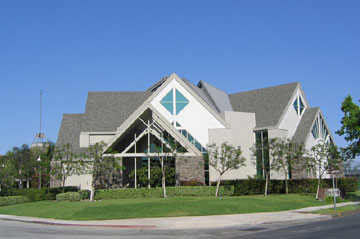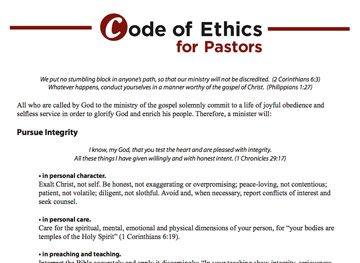Code of Ethics for Pastors: A Commentary
Last Friday, I began to comment on a new Code of Ethics for Pastors, published by the National Association of Evangelicals. Today, I want to continue my commentary by asking: Do we really need a Code of Ethics for Pastors?
“No,” say several of those who commented on my post or in emails. “We simply need pastors to honor to biblical teachings on how Christians, including leaders, ought to behave. Why have a Code of Ethics for Pastors besides what we already find in Scripture. Isn’t the Bible enough? And if pastors aren’t following biblical guidelines for their work, then why would we think a Code of Ethics might make some difference in pastoral behavior?”
I understand the rationale and feelings of those who lament the creation of the Code. And, to an extent, I agree with those who say that the Bible should be enough. In fact, the Code is really just a codification of certain biblical principals as they are relevant to pastoral ministry. If this is the case, why bother to create the Code? Why not just let Scripture speak for itself?
Let me answer these questions briefly.
Following the Example of the New Testament
Within the writings of the New Testament, we can find passages that could be described as codes of ethics for pastors. Consider, for example, 1 Timothy 3:1-13:
The saying is sure: whoever aspires to the office of bishop desires a noble task. Now a bishop must be above reproach, married only once, temperate, sensible, respectable, hospitable, an apt teacher, not a drunkard, not violent but gentle, not quarrelsome, and not a lover of money. He must manage his own household well, keeping his children submissive and respectful in every way— for if someone does not know how to manage his own household, how can he take care of God’s church? He must not be a recent convert, or he may be puffed up with conceit and fall into the condemnation of the devil. Moreover, he must be well thought of by outsiders, so that he may not fall into disgrace and the snare of the devil.
Deacons likewise must be serious, not double-tongued, not indulging in much wine, not greedy for money; they must hold fast to the mystery of the faith with a clear conscience. And let them first be tested; then, if they prove themselves blameless, let them serve as deacons. Women likewise must be serious, not slanderers, but temperate, faithful in all things. Let deacons be married only once, and let them manage their children and their households well; for those who serve well as deacons gain a good standing for themselves and great boldness in the faith that is in Christ Jesus.
In this passage, the Apostle Paul spells out certain standards for church leaders. He summarizes biblical principles that can be found elsewhere. He is writing, not just for individual leaders, but for the church so that it might acknowledge leaders who will lead well.
Those who drafted the Code of Ethics for Pastors were imitating the example of Paul by emphasize moral guidance for church leaders today. But, one might ask, why not simply use what Paul wrote? It is, after all, part of divine Scripture. Why write something new today when we already have a biblical code of ethics for pastors?

My answer would be that biblical truth needs to be considered and applied in each and every cultural situation. As times change, as situations change, as cultures change, the need will arise for fresh articulations and applications of God’s timeless truth. For example, the Code of Ethics for Pastors includes a section called “Facilitate Fairness.” One aspect of fairness includes, “Advocate for equitable pay and benefits for staff.” Nothing exactly like this can be found in the New Testament, though the principle of fairness for workers is squarely based on Scripture. The New Testament writers would not have said anything like this because there weren’t paid pastors in the first century, let alone paid church staffs. Yet, in a day when many churches have paid staff members, and when some churches do not pay their staff adequately, then it is important for pastors to “advocate for equitable pay and benefits for staff.” The Code of Ethics for Pastors makes clear for today what is implicit in Scripture. It helps pastors do their job faithfully. And it may also help a church understand why its pastor is urging them to pay their staff more fairly.
Throughout the history of the church, Christians have created tools to help pastors lead their churches. These tools are often based on Scripture. Sometimes they are called creeds or confessions, sometimes catechisms or constitutions. As a Reformed Christian, I believe that these tools are helpful, but only insofar as they rightly apply biblical truth to some new situation. The Code of Ethics for Pastors, therefore, will have value if it is both faithful to Scripture and relevant to the needs and challenges faced by churches and pastors today.
I believe it is, at least to an extent. More later.











